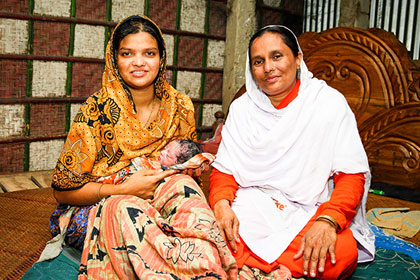Alliance for Maternal and Newborn Health Improvement (AMANHI) Study

Location
Sylhet District, Bangladesh
Background
The Alliance for Maternal and Newborn Health Improvement (AMANHI) study in Sylhet district, Bangladesh, is using ongoing newborn intervention trials to obtain data critical to maternal, fetal and newborn health.
Study Objectives
- Identify causes of maternal deaths, newborn deaths and stillbirths using standardized verbal autopsy
- Measure morbidities during pregnancy, childbirth and the postpartum period; and identify their associations with outcomes such as stillbirths, preterm births and intrauterine growth retardation
- Identify simpler tools that community health workers can use to detect preterm births
- Create a bio-repository of maternal, newborn and paternal biological samples to detect biological and genetic markers of adverse pregnancy outcomes
Key Facts
- About 10 million women worldwide experience severe pregnancy-related complications each year, of whom about 289,000 died annually
- 2.7 million newborns die annually, accounting for about 44% of deaths in under-five children
- Approximately 2.6 million stillbirths occur annually, of which about 1.2 million occur during labor
About The Network
- The Alliance for Maternal and Newborn Health Improvement includes investigators from ongoing community-based studies on maternal and newborn health interventions in South Asia and sub-Saharan Africa, as well as the World Health Organization
- Investigators study pregnant women and newborns at 11 sites in 8 countries: Bangladesh, DRC, Ghana, India, Kenya, Pakistan, Tanzania and Zambia
- Data are collected using commonly agreed upon definitions and methods
Principal Investigator
Abdullah H. Baqui, JHSPH
Local Principal Investigator
Mohammed Abdul Quaiyum, ICDDR,B
Funding
- Bill & Melinda Gates Foundation
- World Health Organization
